The best fitness trackers for women to help improve your exercise, sleep, and stress habits in 2025
The best fitness tracker for you should help improve your fitness and sleep schedule with advanced data insights, lifestyle suggestions, and health monitoring


Some top smartwatches sit among the best fitness trackers, but not all fitness trackers are smartwatches. These devices focus more on tracking your workouts, sleep, and stress levels than helping you navigate daily life. So, before you buy, it's worth considering what you want more - fitness tracking or a virtual assistant. If it's fitness tracking, you're in the right place.
Over the last five years, I've had my hands on close to 100 fitness trackers and smartwatches. From the best Garmin watches and best Fitbits to newcomers from the likes of Oura, Coros, and Huawei.
I've tried them all, logging dozens of hours every month with one on my wrist. I tested these fitness trackers on runs, walks, gym workouts, days out on the bike, and overnight, to reveal the best of the best. Here is my updated list of favourites for 2025.
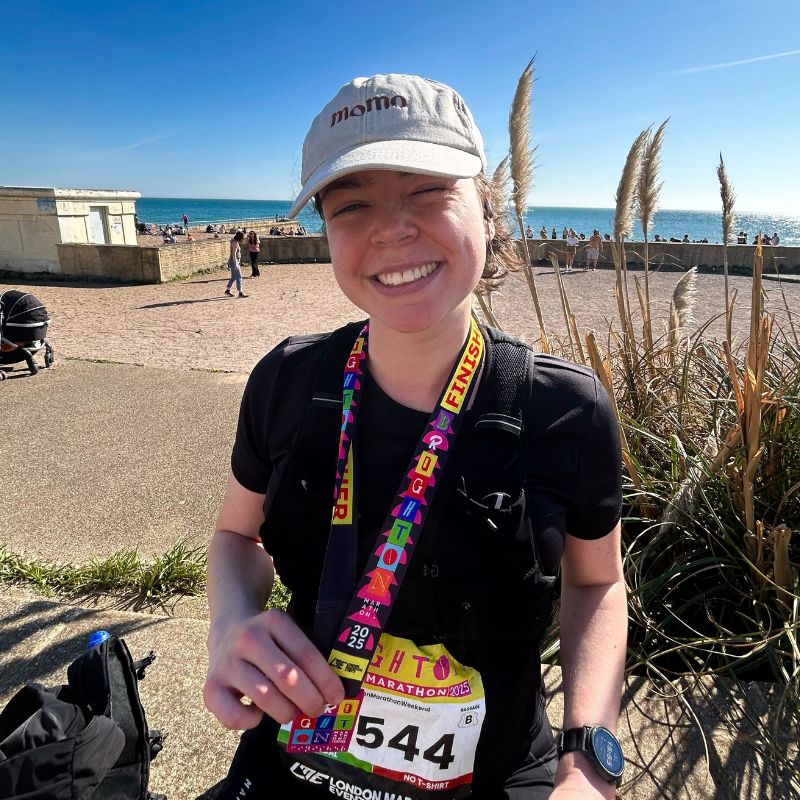
I'm woman&home's digital health editor, a marathon runner, a cyclist, and a regular gym goer. I'm also a qualified fitness instructor and finishing up my Level 3 Personal Training qualification this year, so I know a thing or two about optimising an exercise routine.
In the latest update (07/07/2025) to this guide, I included the Oura Ring 4, an option for those interested in learning more about their sleep and stress levels.
The quick list

For an all-rounder, it's got to be the Garmin Venu 3. This watch blends highly accurate health sensors with handy smartwatch capabilities, providing expert data for all workout types, alongside sleep, stress, and recovery insights. You can also play music through the device and follow on-screen workouts. The design is one I love too - it looks discreet yet premium on the wrist and comes in many colourways.
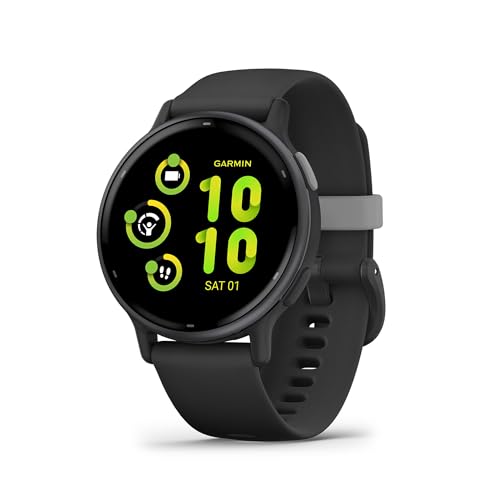
Blending a relatively budget-friendly price with easy-to-use functionality, the Garmin Vivoactive 5 is ideal for those looking to exercise more. It has a stunning AMOLED display and over 30 workout modes to choose from, so whether you're getting settled at the gym or heading out on your bike, you're covered. It also has sleep and stress tracking sensors, along with some basic smartwatch features.
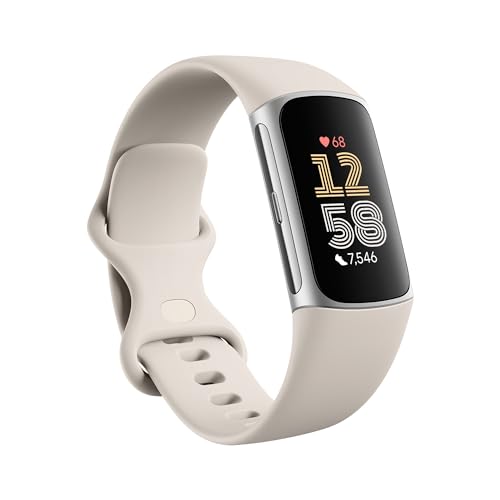
The Fitbit Charge 6 is the newest Fitbit and arguably the brand's best fitness tracker for women. It sits neatly on the wrist, has over 40 workout modes, and is easy to use for both fitness tracking (with Bluetooth connectivity to your favourite workout machines at the gym) and daily life, with call and text push notifications on the screen. It's also one of the most accurate, with 60% better heart rate monitoring than the previous Charge model.
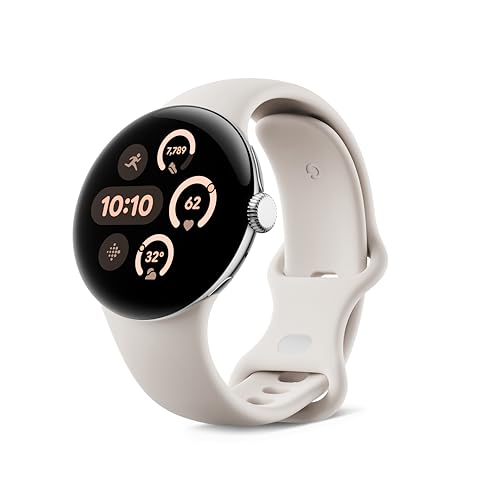
If you're an Android user, the Google Pixel Watch 3 should be high on your list for consideration. I loved using it so much, I almost swapped to an Android phone. With Google's design and technology, and Fitbit's know-how, it's the perfect blend of functional and stylish. You'll find advanced workout data to match Apple's offering, alongside excellent connectivity to the likes of Google Maps, Wallet, and Mail.
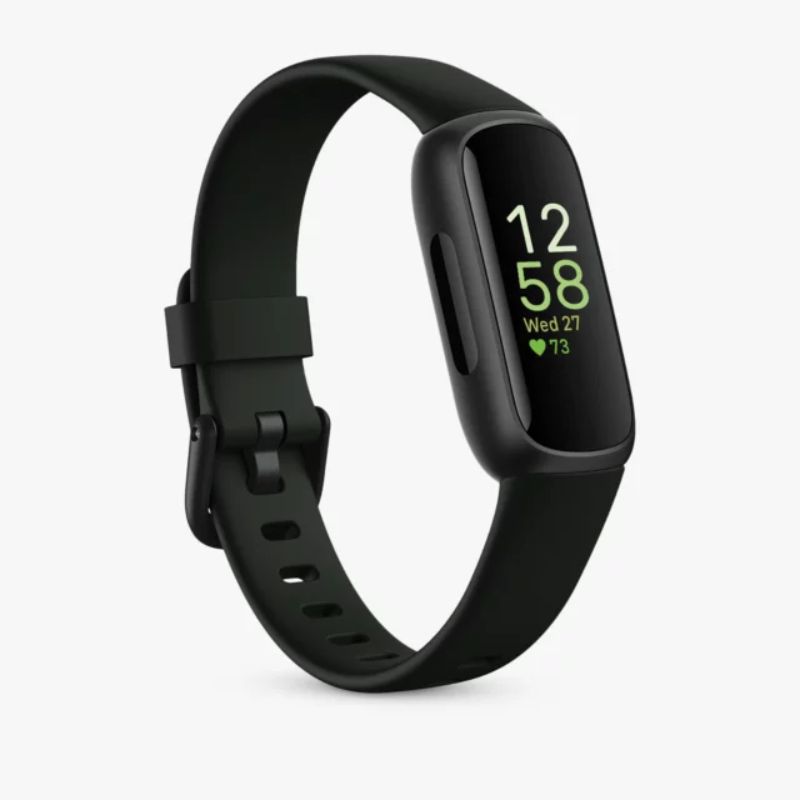
Looking to spend less than £80 on a fitness tracker? The Fitbit Inspire 3 is the only one I'd recommend at this price point. It covers the basics with over 20 workout modes, sleep and stress sensors, and minimal smartwatch features like text notifications. It's the perfect starting watch for anyone looking to do more steps or hold themselves accountable in a workout routine.
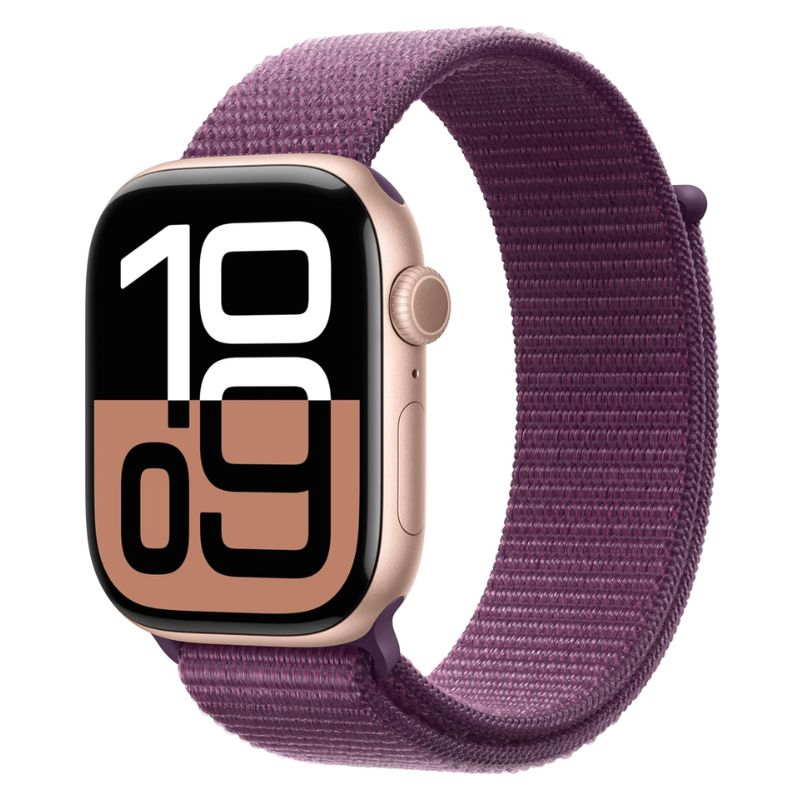
This is Apple's sleekest, thinnest, and quickest-charging Apple Watch yet. While battery life is still an issue, it wins on the fitness tracking front with more workout modes than you'll know what to do with, and impressive fitness tracking data, alongside sleep, stress, and recovery insights. The smartwatch features are the most unique benefit, though, making it one of the better choices for iPhone users.
Load the next 3 products ↴

The Coros Pace 3 is my favourite running watch for three reasons: it's so easy to use, it offers genuinely useful insights into form, cardio fitness, and endurance levels without going over the top, and it balances exertion with recovery to offer valuable insights into how your body is doing. While the design might be too sporty for some, it's a small sacrifice for these top-tier features.
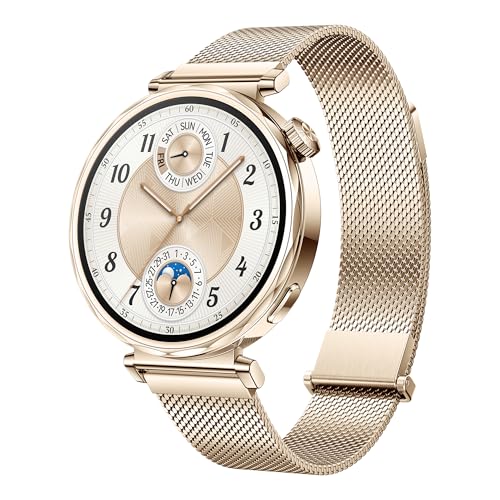
The Huawei GT 5 Pro is the option for those who'd rather not have anyone know they're wearing a fitness tracker. The stainless steel casing feels premium, and I love this gold Milanese design for a premium edge, but there are multiple design options to suit your style. All come complete with expert insights into your workout habits, with an impressive 100 workout modes to scroll through. This watch also excels in sleep tracking and health sensors, with an ECG sensor built in.
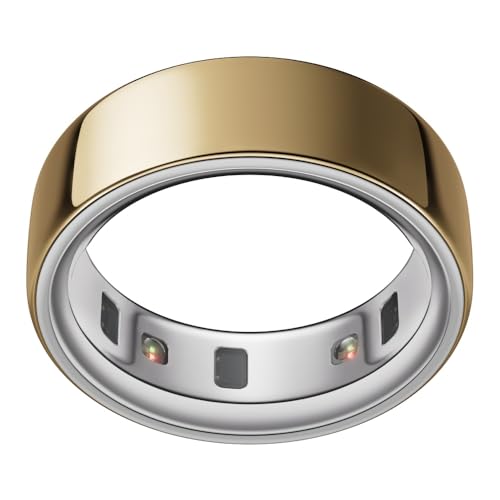
Want to sleep better? The Oura Ring 4 is a game-changer when it comes to monitoring your sleep, stress, and activity habits. Sitting on your finger in this discreet design, the multiple sensors track sleep stages, heart rate variability, body temperature, and so much more to provide a detailed overview of your health every day.
The best fitness trackers for women, tested by w&h
The best fitness tracker overall

Specifications
Reasons to buy
Reasons to avoid
The Garmin Venu 3 is a fitness tracker that ticks all the boxes. It offers expert workout and sleep insights alongside excellent smartwatch features, packaged up in a sleek design with an AMOLED screen that doesn't look out of place in the gym or at the office.
It does the basics - from tracking your step count, calorie burn, and heart rate throughout the day - and so much more. For instance, if you go for a run, you'll see your distance and speed as any of the best fitness trackers would show you - but you'll also get advanced running dynamic insights in the app when your workout is over. This includes cadence, ground contact time, and vertical oscillation, which can help improve your running form and efficiency. In the gym, I loved how I could record my repetitions, sets, and even the type of movement I was doing to track my progress in granular detail. The fact that you can follow along with HIIT, strength, and Pilates workouts with animations on your wrist is another plus, making this a watch suitable for beginners just as much as for those who've been working for decades.
You'll also find you can connect your watch to your favourite music streaming service (apart from Apple Music) and headphones for phone-free listening, which is rare - unless you go for the Apple Watch Series 10 or other premium smartwatches. You can also set timers and alarms, receive notifications from emails, calls, and text messages, return phone calls (provided you're connected to an Android phone), and pay for things with a flick of the wrist, making life a little more seamless.
Truly, there's very little this smartwatch can't do - but if you're a runner, it's worth weighing up Garmin Venu vs Forerunner before adding the Venu 3 to your basket. My preference is also for the Garmin Venu 3S ('S' standing for 'small') as I find it's a better fit on my wrist than the regular size, but this is down to personal style and fit, so consider both.
For more, read our full Garmin Venu 3 review.
The best fitness tracker for beginners
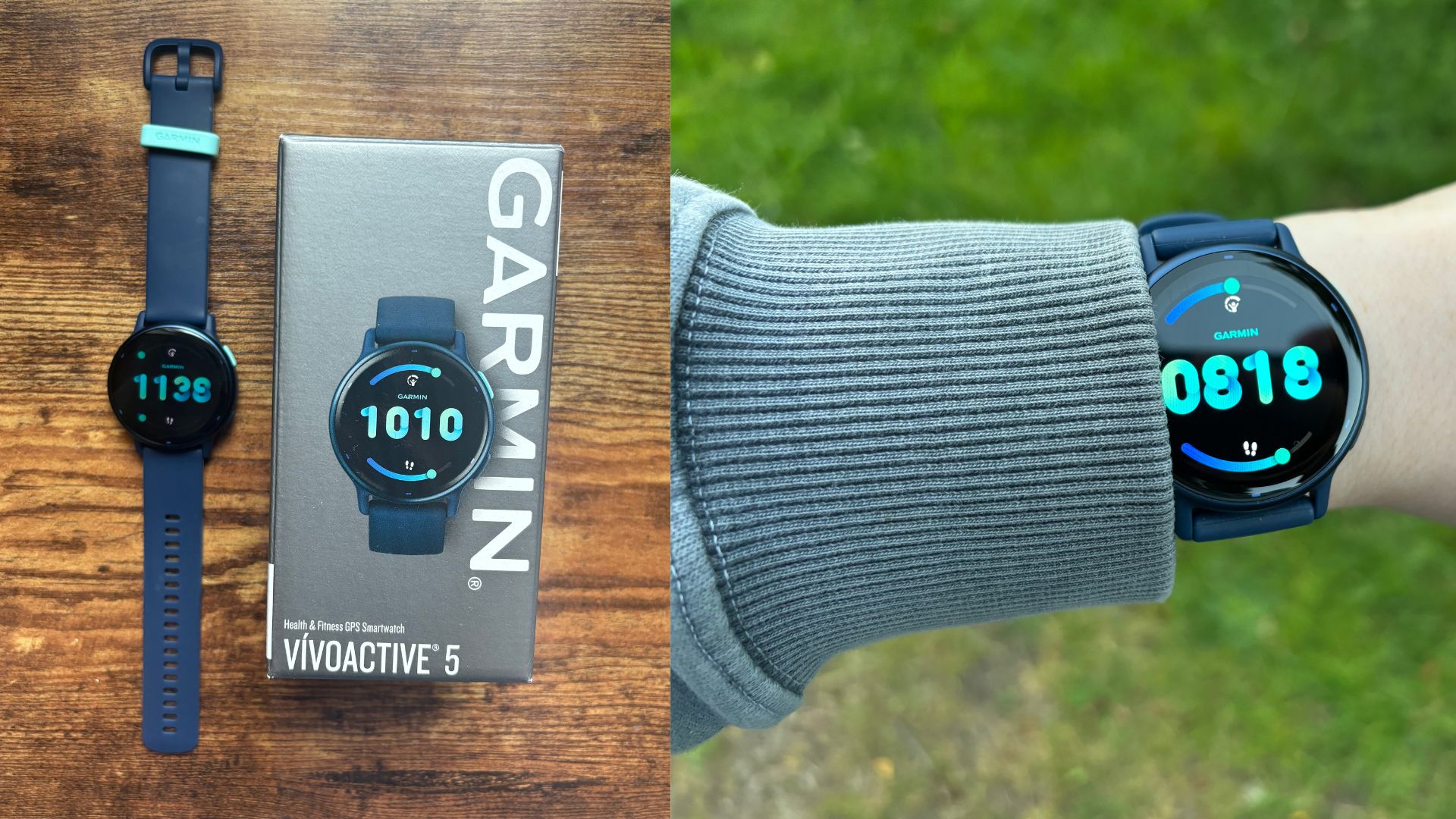
Specifications
Reasons to buy
Reasons to avoid
I'd choose the Vivoactive 5 every time if I were someone looking to exercise more often in various ways, record my sleep and stress levels, and have some help with daily life through timers, reminders, and phone notifications. Not only is it so simple to use, easing you into the world of fitness tracking, but I found this watch provides genuinely useful insights you can use to change your lifestyle for better health and wellbeing.
Woman&home writer and former editor Ciara McGinley reviewed the watch before me and gave it points for accuracy and ease of use. "I could find my activity and start a workout at the touch of a button, and I could see all the essential stats on my watch screen when I was done - including distance, pace, heart rate zone, and a timer. When I was doing strength training workouts, I could count my reps, something few fitness trackers offer," she says. The only other watches on this list that do this are the Garmin Venu 3 and the Coros Pace 3.
The design is also a winner - small and compact, but with an AMOLED screen large enough to see everything you need to even on the move. With the Garmin Vivoactive 6 now out too, you can either upgrade for even-better features or find a deal on the Vivoactive 5 in the Garmin sale - win, win.
For more, read our full Garmin Vívoactive 5 review.
The best fitness tracker from Fitbit

Specifications
Reasons to buy
Reasons to avoid
The Fitbit Charge 6 is the newest Fitbit and the best Fitbit out of all the models. You can trust me on that, as I've tried every single one. With 60% more accurate heart rate monitoring than the Fitbit Charge 5 (by the brand's own admission), it's a remarkable upgrade, and for those who want a one-and-done tracker that covers everything with ease - from recording workouts, step count, sleep and stress habits to lifestyle assistance with voice dictation and even in-built GPS with turn-by-turn navigation - it's a great choice.
All those features make it sound like an advanced tracker, but that's far from the case. The Fitbit Charge 6 is easy to use, with all the essential information on the home screen, including your heart rate and your pick of other features - anything from distance covered that day (runners, you'll be pleased to hear that) to calorie burn. Any other feature, including workout modes, is available in a few swipes. So whether your goal is to do more steps or you want to train for your first 10km, you're covered. Of course, gym workouts, Pilates, yoga, and more are covered in the 40+ workout modes. And just like any other Fitbit, all the key insights are available in the app.
The small screen is the only downside to the Charge 6, so it's worth weighing up the Fitbit Charge 6 vs Versa 4 if this is a concern for you as this one has a larger, square screen. I found it hard to view my statistics on the move with this device, especially when walking or running. However, the smaller design means it sits discreetly on your wrist, so sometimes it's not even obvious you're wearing a fitness tracker. Plus, it sits among the more affordable trackers on the list at just under £140.
For more, read our full Fitbit Charge 6 review.
The best fitness tracker for runners
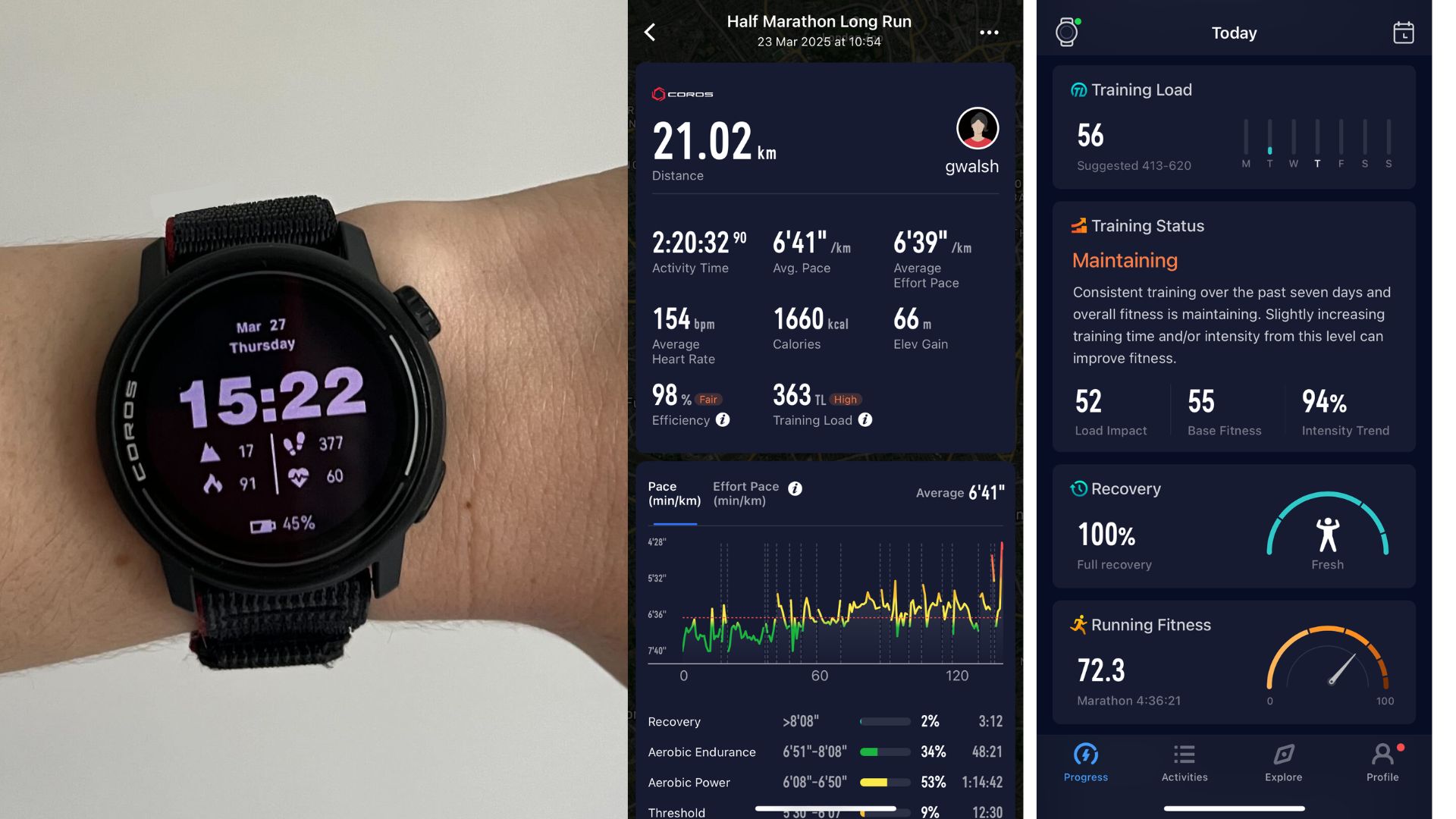
Specifications
Reasons to buy
Reasons to avoid
The Coros Pace 3 is a beginner-friendly tracker that's capable of elite-level performance. It can take you from your first 5km to ultra-marathon training, so it's perfect for runners of all kinds. It's my pick as it combines an easy-to-use watch interface, allowing you to view your heart rate zones, pace, distance, and other essential metrics on your wrist during an indoor, outdoor, or trail run, with advanced technologies I'd expect to pay much more for.
For example, you'll be able to see your running cadence, stride length, elevation, and the effect every run has on your training on your wrist and in the app. Here, you can also plan a route on a 3D map and send it to your device for turn-by-turn navigation on your wrist. Only some of the top Garmin watches offer this, and these stretch into the £400+ price point, whereas the Coros Pace 3 sits at a comfortable £219.
On my wrist, along with the basics like step count, heart rate, and estimated calorie burn, I can also see my Running Fitness (with predicted race times), Training Load, and Intensity Trend, which offer valuable insights into my fitness levels, perceived exertion, and recovery time. I also wear my watch to bed for sleep insights and Heart Rate Volume (HRV) for the night, which I religiously check to see how well I slept.
But what makes this running watch stand out most for me is how accessible it makes running, winning it big points in the Coros vs Garmin debate. For example, if you're not familiar with what HRV means, don't worry - you'll see a comprehensive explanation in the app, which is also very easy to navigate. The smartwatch features are limited and the design is very sporty, but I can live with this for all the benefits this watch has.
For more, read my full Coros Pace 3 review.
The best fitness tracker for Apple users
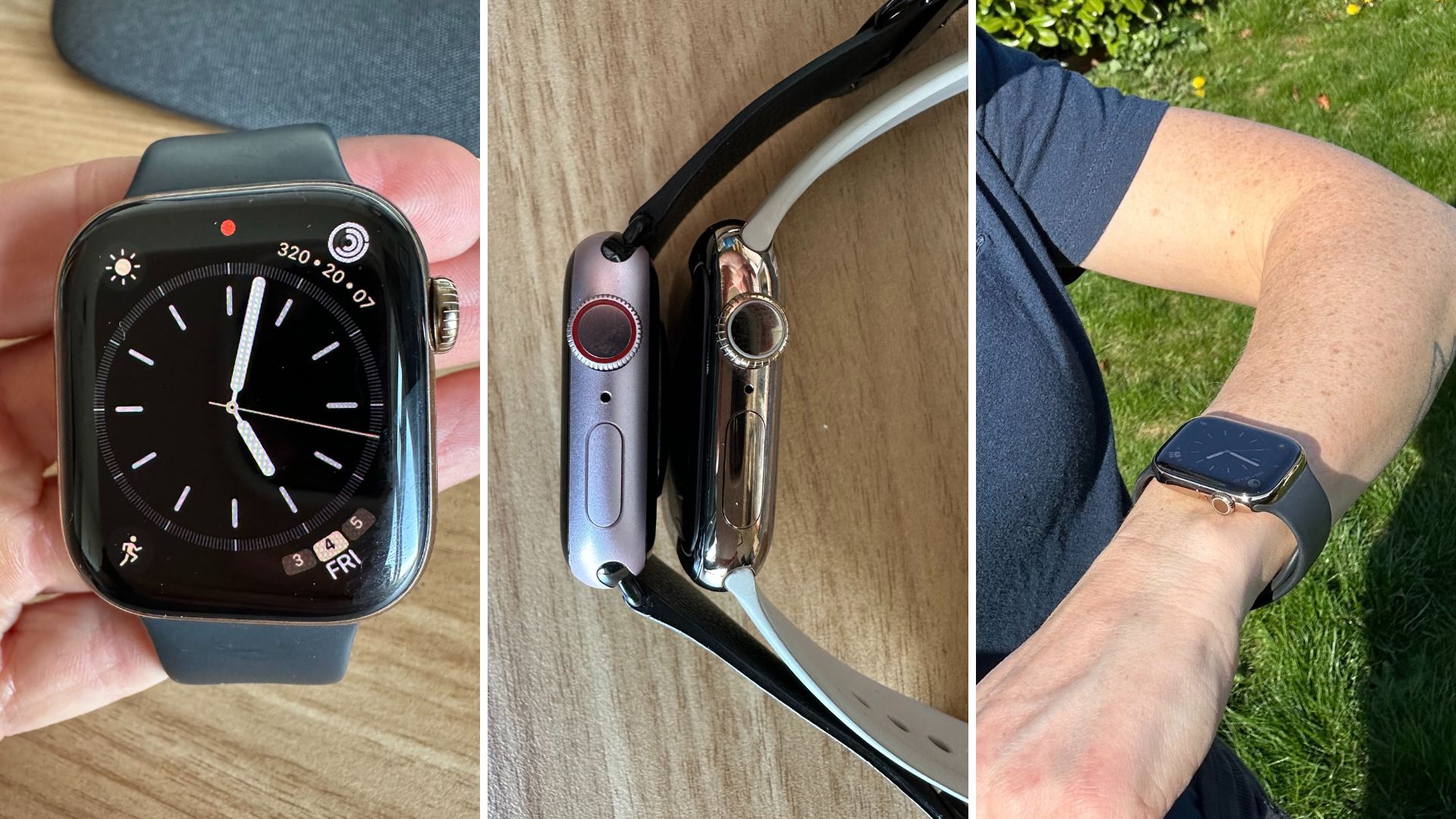
Specifications
Reasons to buy
Reasons to avoid
If you're in the Apple universe, it makes sense to at least consider the newest Apple Watch. With this one, you'll find all your favourite fitness tracking features, like the Activity Rings and workout modes, which you can use to track over 20 different types of exercise. Swimmers, you'll get even better insights with a new depth gauge and water temperature sensor, and runners you'll get data on your pace that monitors improvements over time.
Recovery insights like the Training Load feature, also seen on the Apple Watch Series 9, and the addition of a Sleep Apnea detection feature make the Apple Watch Series 10 worth considering for those looking to get a balanced picture of health and wellbeing.
Digital Editor Kerrie Hughes has had this one on her wrist for three months, recording workouts, tracking her sleep, and making full use of the impressive smartwatch features, which is where this pick of the best fitness trackers for women really excels. "As a busy mum of three, the timers, alarms, reminders, to-do list, and nudges to move my move or take a moment to breathe are all ones I use every day and I wouldn't be without them now," she says.
Don't fancy all those smartwatch features? Try weighing up Garmin vs Apple Watch if you're looking for something more focused on fitness tracking.
For more, read our full Apple Watch Series 10 review.
The best fitness tracker for Android users
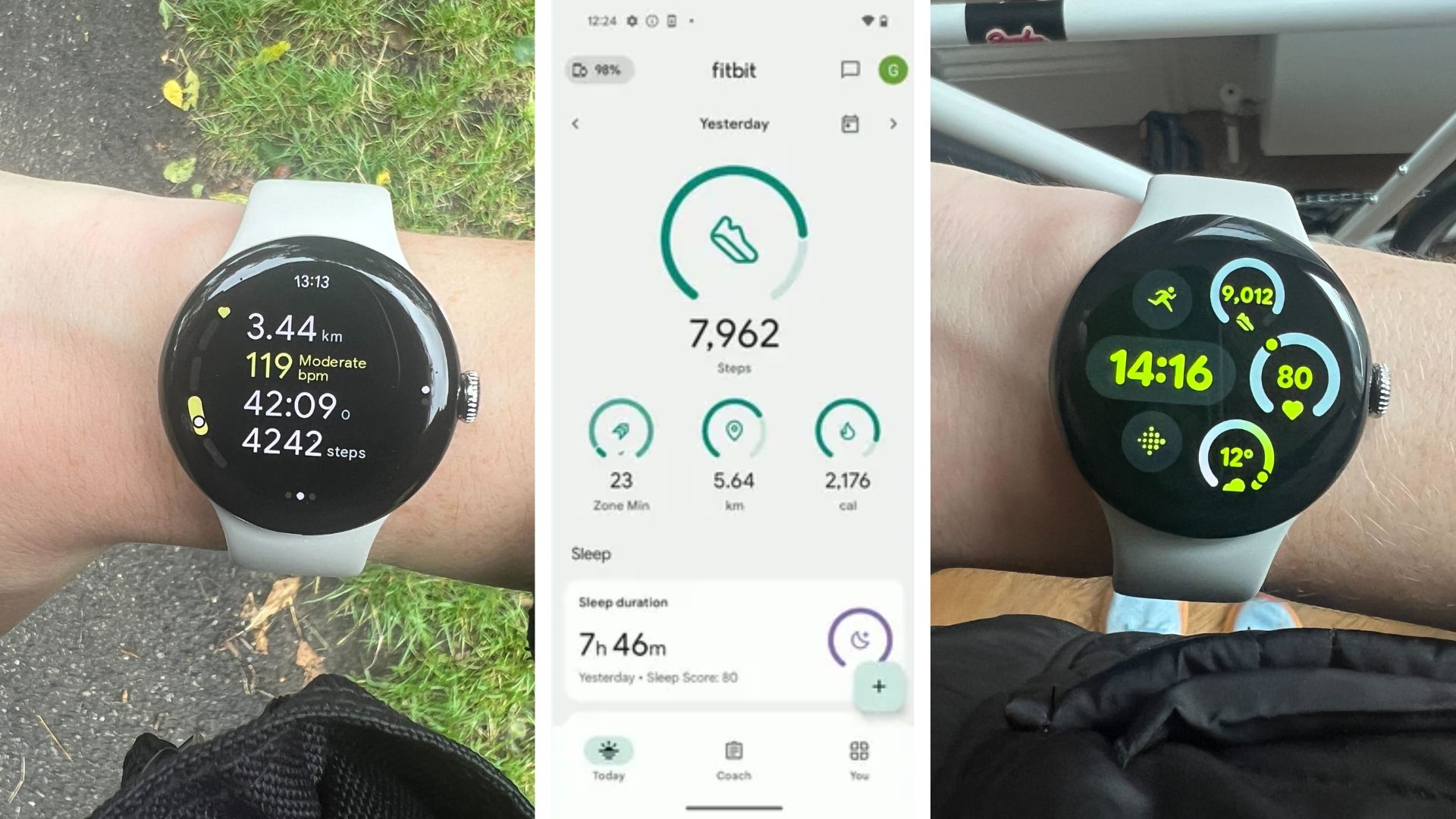
Specifications
Reasons to buy
Reasons to avoid
If I weren't 10 years deep in the Apple ecosystem, I'd be switching to an Android phone just to use this fitness tracker. The Google Pixel Watch 3 is one of the first devices in the Fitbit-Google collaboration, so it has the best of high-end technology with Fitbit's reliability and ease of use, wrapped up in a premium round-face design.
I wore this tracker religiously for weeks, recording my runs, strength training workouts, and mobility sessions on the watch. I see cardio lovers getting the most benefit with advanced running metrics - like stride length, step cadence, and vertical oscillation - to rival any Garmin device and in-built GPS. But there's plenty for everyone else too, with over 40 workout modes, the option to build a custom workout, and a quick-start option from the home screen. When your workout is done, you'll get all the insights you need on your watch face in a scrollable format and in the Fitbit app. The same goes for your sleep metrics, provided you wear the watch to bed.
The complete integration with Google makes this a 4.5-star tracker in my eyes though. Along with the basic smartwatch features you'd expect - like weather reports and text notifications - you can navigate your way through your Gmail emails, check your schedule for the day via Google Calendar, pay for your coffee using Google Pay, and follow a route (in workout mode or not) using Google Maps, all from your watch face. You can also connect to Amazon Music, Spotify, and YouTube Music for wireless listening.
For more, read my full Google Pixel Watch 3 review.
The best budget fitness tracker
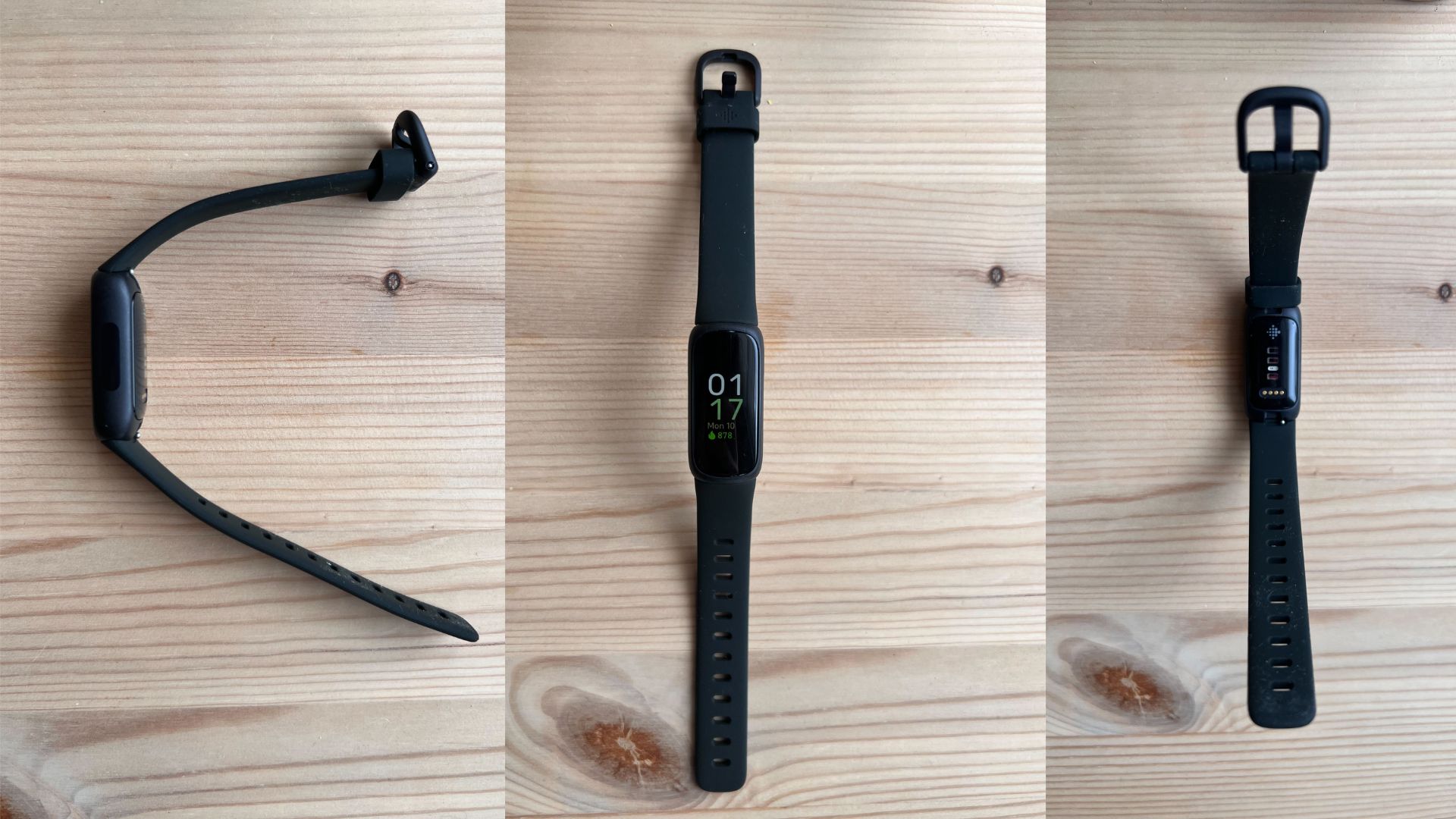
Specifications
Reasons to buy
Reasons to avoid
The Fitbit Inspire 3 is my other favourite Fitbit. While it doesn't have the features of the Charge 6, it's still a great option, especially for those looking to spend under £100 on their fitness tracker. With its 20 workout modes, discreet design, and (albeit limited) smartwatch features, you can't go wrong.
What I love about the Fitbit Inspire 3 (aside from the price) is how easy it is to use, making this a great fitness tracker for beginners. All the workout modes are accessible via a quick swipe of your finger on the small screen, and at any time, I can glance down at my wrist and see my step count, heart rate, and calorie burn for the day, alongside the date and time.
However, if you're a runner or a keen walker, I'd recommend spending a little more and opting for the Fitbit Charge 6, or weighing up Garmin vs Fitbit before buying. The Fitbit Inspire 3 doesn't have built-in GPS, which means your phone has to stay seamlessly connected to the watch to get your route at the end of your workout as well as any distance, pace, or time metrics. That's not a risk I'd be willing to take. For anyone just looking to get 10,000 steps in or record their gym workouts, this shouldn't be a problem.
For more, read my full Fitbit Inspire 3 review here.
The best discreet fitness tracker
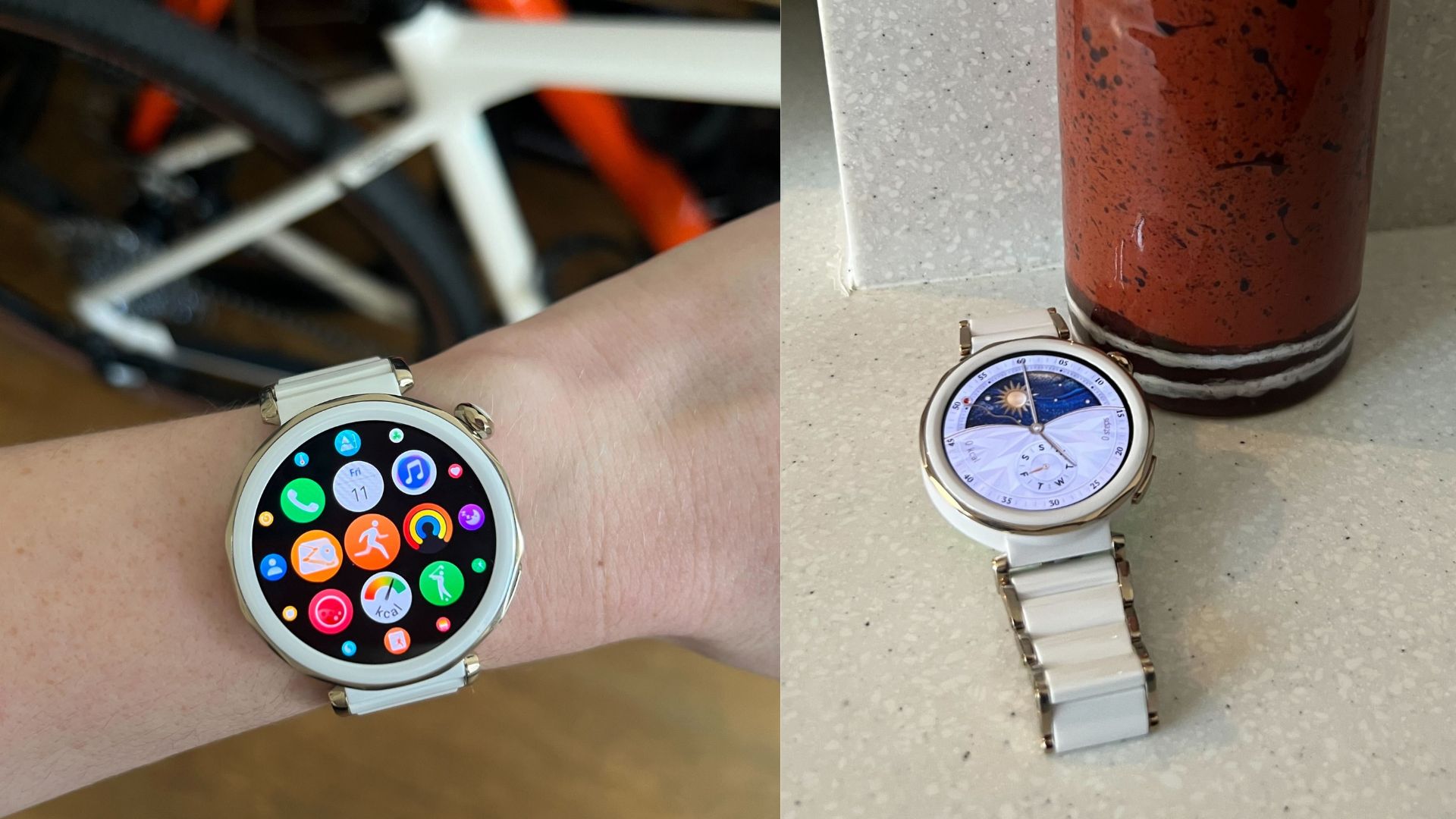
8. Huawei Watch GT 5 Pro
Our expert review:
Specifications
Reasons to buy
Reasons to avoid
The Huawei GT Pro 5 has a design unbeaten by any other smartwatch on this list, and it's the go-to for anyone looking to seamlessly blend their fitness tracker into everyday outfits. While even the sleekest Apple Watch or Garmin will still look like a fitness tracker, I would challenge anyone to see through this watch's disguise before tapping the screen.
It's available in three colours: white ceramic or white leather (and black silicone or titanium, but these are much larger and typically designed for men). The watch has a real premium feel and is weighty on the wrist like any other ceramic timepiece would be, giving it an authentic feel, but it's not too heavy to move with. It also has a sapphire glass screen and the watch faces are customisable in the app.
While I opted for the white ceramic GT 5 Pro, there's a gold metallic band available in the regular GT5, which has very similar features but lacks the impressive battery life. If gold is more your style, I'd recommend opting for this one instead of the white ceramic.
Speaking of the impressive battery life, the Huawei Watch GT 5 Pro lasts for 16 days (even when using it for workouts), which is much longer than any other device on my list of best fitness trackers.
I wasn't as familiar with Huawei as other brands like Apple, Garmin, and Fitbit when I tried the GT 5 Pro, but it's quickly become one of my favourites - and not just for the design. You can track workouts like running, walking, and cycling (indoor and outdoor), alongside many other exercises in just three taps, making it easy to keep up with your exercise routine. In the Huawei Health (Europe) app, you'll find your insights into your workout and insights into your day, in a panel that looks very similar to Apple's Activity Rings - with scores for activity, exercise, and standing. You'll also see your step count.
I also found the stress and sleep tracking features simple to use, with the ability to record your sleep and monitor sounds like snoring in the app for a better sleep assessment, which is very unique.
The best sleep tracker
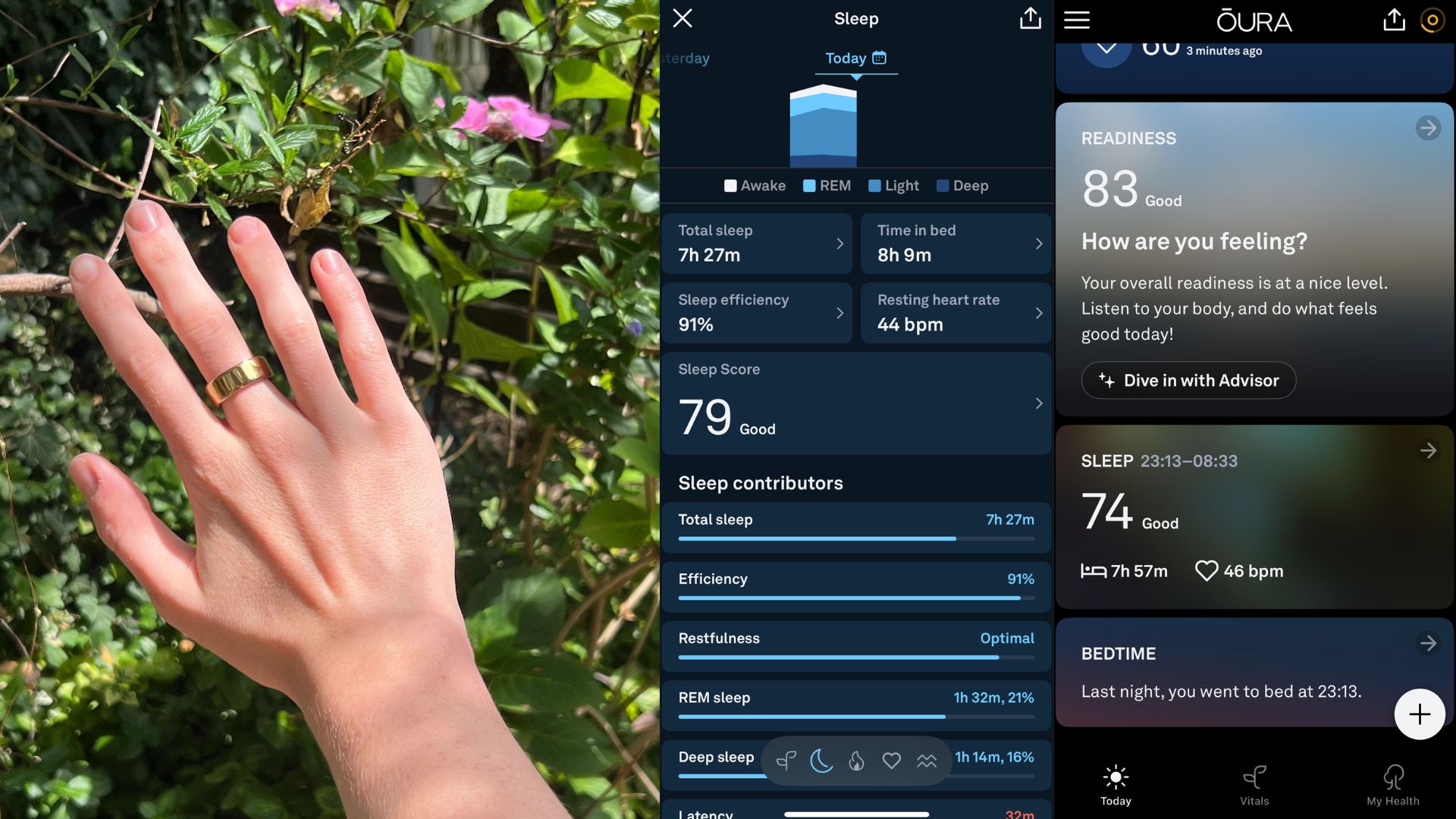
Specifications
Reasons to buy
Reasons to avoid
In the ever-growing world of smart rings, Oura remains a standout. I wore the ring for a month of testing, and I haven't taken it off my finger since. For advanced sleep and stress insights, it's truly the best on my list.
The various sensors track sleep stages, heart rate variability, body temperature, and more to deliver a Sleep Score every morning. I discovered that I struggle with sleep latency via my insights, meaning I'm not very good at getting to sleep quickly when I get into bed. I've used this to improve my sleep hygiene over the last few weeks and noticed a big change in how I feel in the morning. More than just a fitness tracker, the Oura Ring 4 helps make visible, tangible improvements to your life and routines.
Alongside sleep data, the ring tracks basic activities like workouts (distance, pace, heart rate zones, and GPS route) and your step count. It's very accurate overall, but not as detailed as the watches on this list offer, so I'd weigh up Garmin vs Oura Ring or Oura Ring vs Apple Watch before making a final decision.
The only downside to the Oura Ring 4 is the subscription fee. If you don't pay it, you'll get limited insights that don't make the ring worth the £300+ cost, but at £5.99 a month, I wouldn't say it's a dealbreaker.
Read my full Oura Ring 4 review
Testing the best fitness trackers for women
How we tested
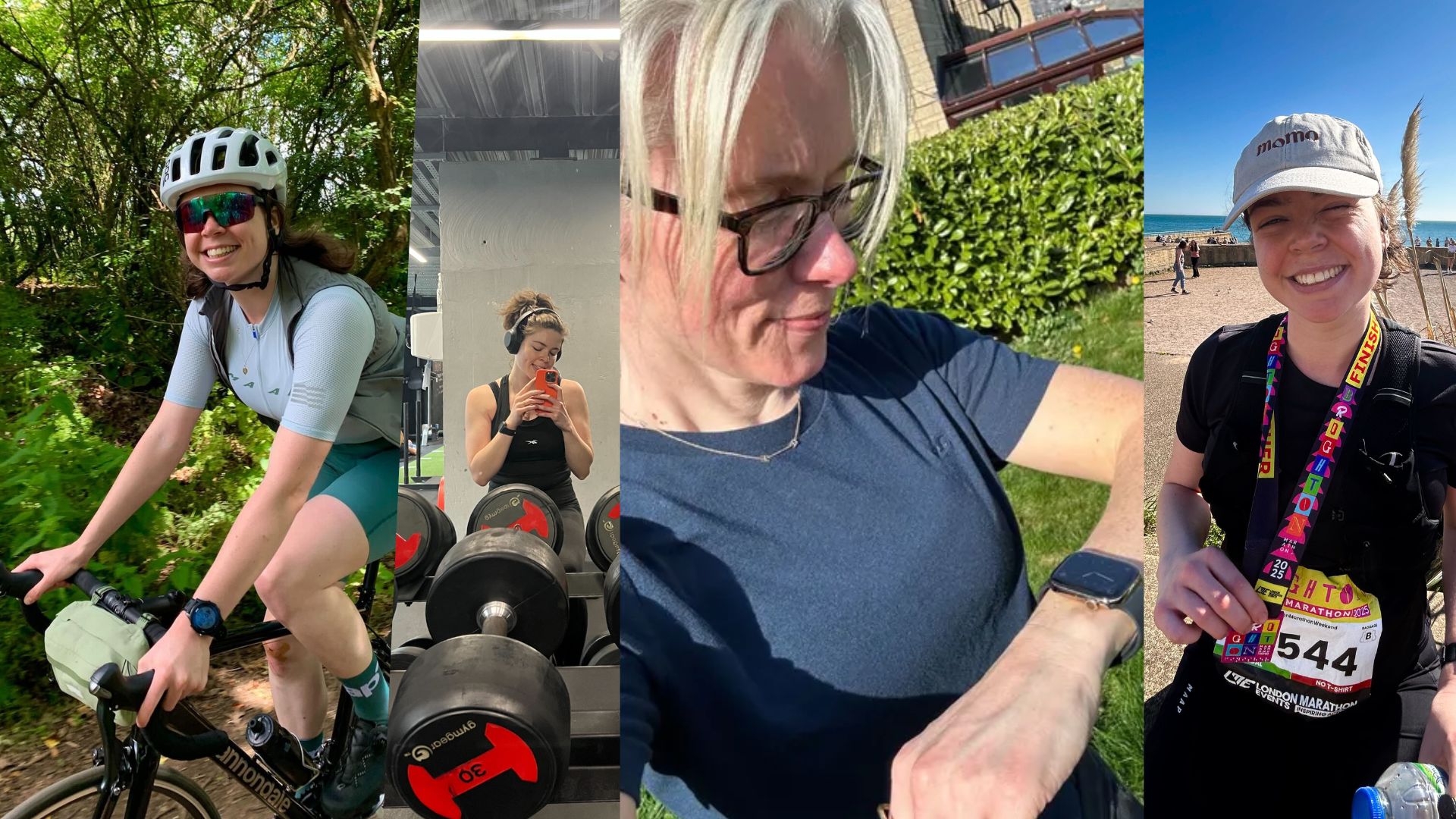
I've put dozens of fitness trackers through their paces over the last few years, logging over 430 hours in my walking shoes, running trainers, on my bike, and elsewhere in the last year alone. In that time, I put many of the fitness trackers on this list through their paces, assessing them for comfort, functionality, and ease of use.
I also enlisted the help of fellow woman&home team members, including freelance writers Ciara McGinley (a meditation practitioner and wellness expert) and Katie Sims (who recently reviewed our favourite HOMOM foldable treadmill), and Editor Kerrie Hughes (a keen weightlifter and gym-goer).
We looked at each of the watches in detail, focusing on the criteria below:
- Workouts: Personally, I used each of the devices I tested for two weeks straight, running and going to the gym at least three times a week. So, between myself and the three other testers, we've likely done close to 100 workouts testing these trackers. You can rest assured they've been put through their paces.
- Ease of use: There's no point in having a fitness tracker that you struggle to use or see insights from. So, we ranked each device we tested for how easy it is to use, so anyone, whether you're a beginner or have been working out for years, can benefit.
- Daily life functionality: Given that smartwatches and fitness trackers are almost one and the same, we ranked each of the watches on this list for their smartwatch features too. While price dictates heavily what smartwatch features a device will have, we noted the ones with the best functionality for daily life with third-party app integrations (like Google or Apple Maps) and useful features like timers, reminders, alarms, call and text notifications, and so on.
- Design: A fitness tracker is supposed to be worn every day so the design was something we considered carefully. We also looked how well the trackers fit on typically smaller wrists, whether it got stuck on our clothing easily, and how seamless it looked with an everyday outfit as well as with activewear.
- Battery: We wear our fitness trackers until the battery forces us to charge them, giving us an accurate idea of how long the battery truly lasts for while using them as they were designed for - so, no low-battery mode here. We used these watches in regular or GPS mode always.
- Price: You can spend upwards of £1000 on a fitness tracker, very easily. And while that works for some people, you don't need to spend that much to get the job done. We balanced features, design, and functionality with price to assess whether pricier watches were good value for money.
How to choose a fitness tracker
- Goal: This is the most important consideration for choosing your pick of the best fitness trackers for women. Do you want to start being consistent with 10,000 steps a day at home or outdoors? Or do you want to start training for a marathon? The watch you'll want for these will be very different.
- Lifestyle: Fitness trackers should fit relatively seamlessly into your lifestyle and what you wear outside of exercise. So, consider the design of the tracker - do you want an obvious fitness tracker? Or do you want something a little more discreet? That's the choice between the Garmin Vivoactive 5 and Huawei Watch GT 5 Pro, for instance.
- Versatility: Are you a runner through and through or do you like to blend different activities into your workout routine? If you like to stick to one activity, a fitness tracker designed for that (like the Coros Pace 3 for runners) is a better idea than a catch-all (like the Garmin Venu 3, our top pick).
- Detail: Even if you've been working out for decades, you might want something simple. I certainly value the simplicity of many Fitbit types even though I've had hands-on close to 100 fitness trackers in recent years. Think about how much detail you want your watch to give you on your workouts.
Are fitness trackers worth it?
Yes, if you plan to improve your fitness levels or maintain your current activities then a fitness tracker can be a valuable tool. As someone who runs and goes to the gym multiple days a week, I wouldn't be without mine.
Research by Loyola University looked into several studies examining the effect of fitness trackers and found that the devices were "a motivational tool that can help improve physical activity". The studies found that the devices offer various psychological techniques linked to behaviour change, such as social support, feedback, badges, and notifications.
Plus, you don't have to break the budget to see the benefits of using one, with options like the Fitbit Inspire 3, Charge 6, and Coros Pace 3.
Fitness tracker vs smartwatch
In 2025, the line between fitness trackers and smartwatches is blurred. I'd say the key difference is that a smartwatch can almost replace your mobile phone whereas a fitness tracker complements your exercise routine and daily life.
Many of the best fitness trackers will offer timers, alarms, call and text notifications, and payment options, but you won't be able to take out your watch and leave your phone at home. You can take a smartwatch, like the Apple Watch Series 10, out of the house and you won't really notice your phone isn't there. From scrolling through Instagram to booking a taxi, this can do it all.
That doesn't mean you should necessarily opt for a smartwatch over a fitness tracker though. Fitness trackers, like the Coros Pace 3 or Fitbit Charge 6, are packed with advanced technologies that may offer you more in terms of improving your health and wellbeing than a smartwatch. They also tend to be cheaper.
If you're struggling to choose between the two, think about what's most important to you.
Sign up to our free daily email for the latest royal and entertainment news, interesting opinion, expert advice on styling and beauty trends, and no-nonsense guides to the health and wellness questions you want answered.

Grace Walsh is woman&home's Health Channel Editor, working across the areas of fitness, nutrition, sleep, mental health, relationships, and sex. She is also a qualified fitness instructor. In 2025, she will be taking on her third marathon in Brighton, completing her first ultra marathon, and qualifying as a certified personal trainer and nutrition coach.
A digital journalist with over seven years experience as a writer and editor for UK publications, Grace has covered (almost) everything in the world of health and wellbeing with bylines in Cosmopolitan, Red, The i Paper, GoodtoKnow, and more.